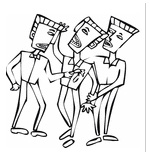
After Dobbs: What’s Next?
PROCLAIMING TRUTH ABOUT JUSTICE & LOVE
Opinions abound about the U.S. Supreme Court’s Dobbs v. Jackson Women’s Health Organization ruling (June 24). Here in California, highly publicized protests have featured women carrying signs calling for “Abortion on Demand, without Apology.” In Los Angeles, four activists chained themselves to City Hall. Thereupon, according to their press release, they dispensed a “river of fake blood” while wearing bloody pants “to represent the women who will die” because of Dobbs. (On the flipside, a columnist for the Los Angeles Times dismissed memorials to preborn victims of abortion as political ploys.) Since the May 2 leak of the Dobbs draft, more than 30 Catholic churches have been vandalized. The furious are in full throttle.
We pro-lifers, in contrast, have welcomed the chance to celebrate a long overdue decision. Gloating has been minimal. We have long said that both women and their preborn children deserve better than abortion and that we should love them both. Here and now, we have a duty to step forward, perhaps even more than in the past.
But count on the controversy to continue and increase. Expect the tumult to persist. Even so, forewarned, we need to look ahead. How should we assess Dobbs, a six-to-three ruling, in terms of its internal structure and logic? Let’s start, though, with a preliminary question. How many people have read the ruling? Probably very few. The document, with appendices, runs to 213 pages. But its introductory “Syllabus” is just eight pages — easy enough homework.
In my view, Dobbs is a decent first step. But its own reasoning doesn’t allow for the next step. It’s a step that justice requires: ending the abortion industry’s destruction of innocent children.
You May Also Enjoy
Our population level is not necessarily bad in and of itself. Rather, it just amplifies the good or evil that is already in place.
Jim Holman is a Catholic who knows his money and talents are only a loan, and that he will have to account for them on Judgment Day.
The influence of post-humanist academics reveals how completely the secular academic world has embraced the culture of death.

